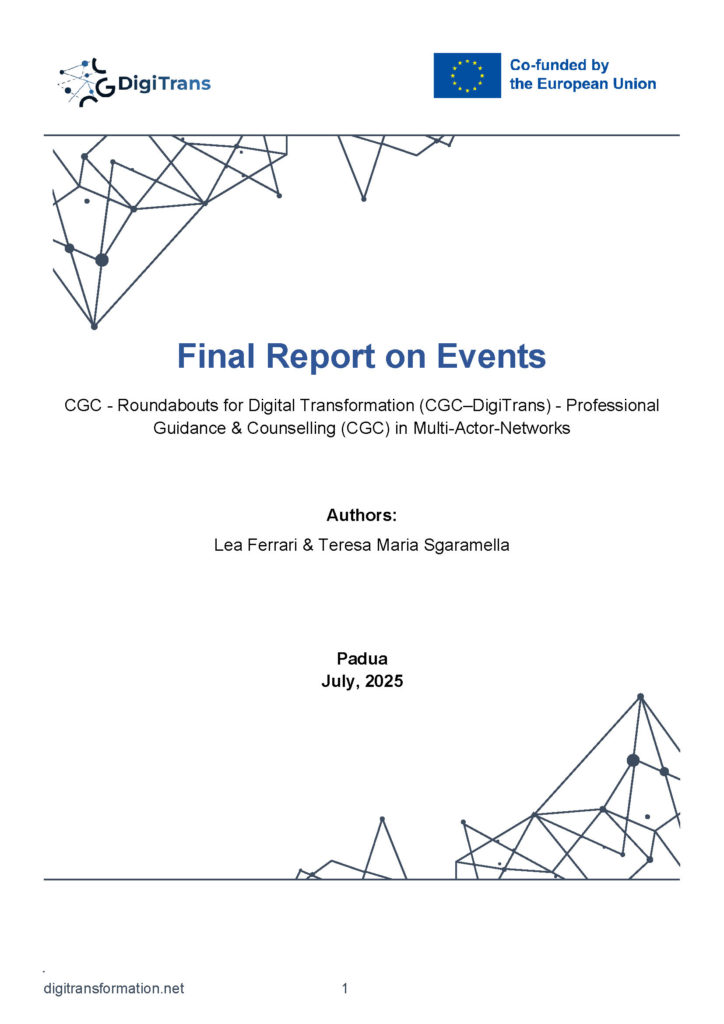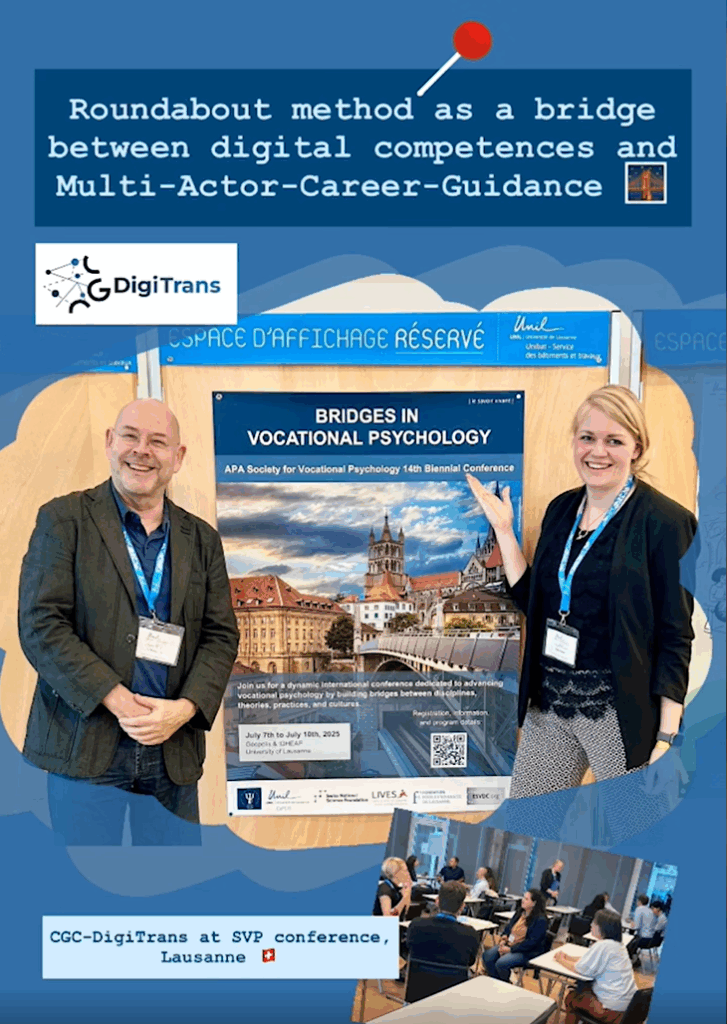
Bridging Perspectives in Vocational Psychology – Insights from Lausanne
Last week, the CGC-DigiTrans team had the privilege of contributing to the 14th Biennial Conference of the Society for Vocational Psychology at the University of Lausanne (July 7–10, 2025).
Under the theme “Bridges in Vocational Psychology” we quite literally built a bridge – between digital competences and Multi Actor Career Guidance (MACG).
In our 90-minute workshop “Career Counselling and Guidance in Times of Digital Transformation: Learning the Roundabout Methodology”
we introduced our Erasmus+ project and explored how collaborative counselling processes can empower people to develop digital competences with the support of a broader network.
Our focus areas included:
🔹 Multi Actor Career Guidance in times of digital transformation
🔹 The Roundabout Method – a structured, participatory approach
🔹 Digital competences as a key to inclusion and lifelong learning
🔹 A curriculum for training professionals in the Roundabout Method
With 12 participants from counselling practice, research, and higher education institutions across nearly all continents, the workshop became a truly global learning experience.
Key Learnings:
1. Digital transformation is everywhere – in everyday life, in work, in learning. From AI to remote collaboration, participants shared concrete examples from their contexts.
2. Those without digital competences risk being left behind – while counsellors must constantly adapt to new skill demands and labour market dynamics.
3. MACG creates real synergy – involving actors like parents, friends, employers, training providers or support services can strengthen counselling outcomes, especially in complex career (re)orientation processes.
The workshop was presented by Jan Woldendorp and Jenny Schulz
Thanks to the further contributors to the workshop: Prof. Dr. Peter C. Weber, Martin Stark, Teresa Maria Sgaramella, Lea Ferrari
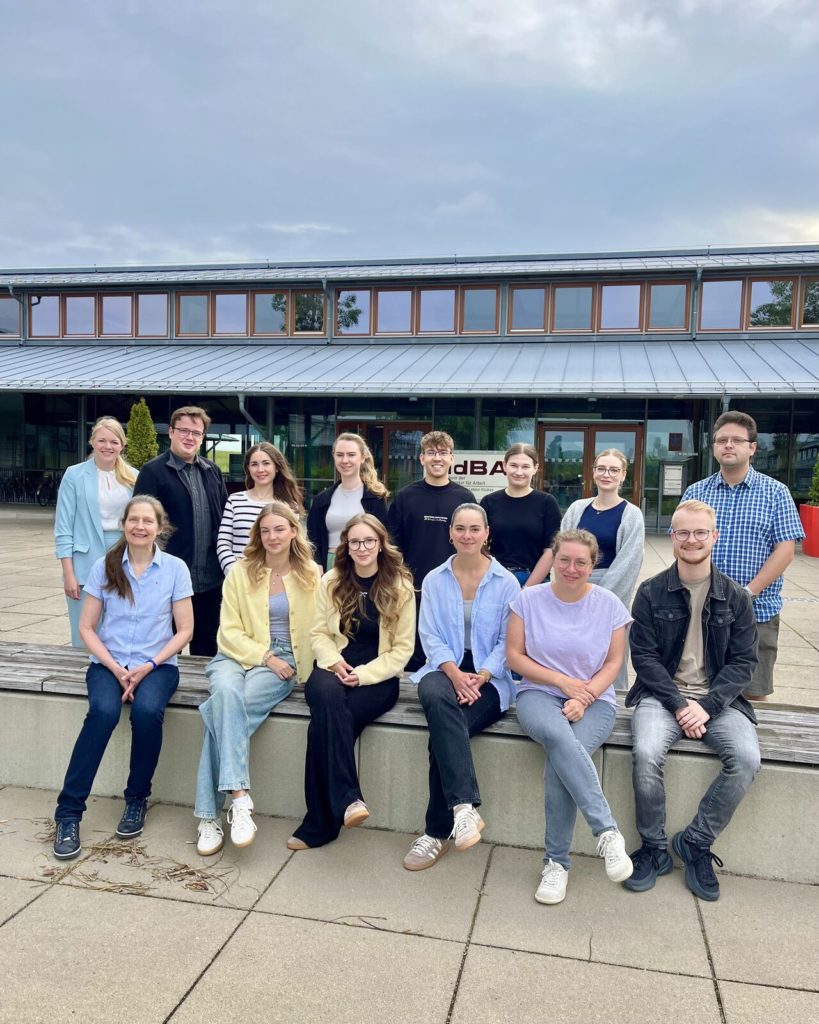
Counselling for the Promotion of Digital Competences in Networks – Insights from the Elective Module at the University of Applied Labour Studies (HdBA)
What happens when you combine multi-actor-career-guidance, network collaboration, and digital competences? In our module, we explored exactly that – with highly engaged students and inspiring outcomes.
From 2–6 June, 17 dual students took part in the HdBA block week in Schwerin, testing the newly developed university curriculum in the elective module “Counselling for the Promotion of Digital Competences in Networks.”
The module was developed at the European level as part of the CGC-DigiTrans project, and this was its pilot implementation in Germany.
How did the students sum up their experience in a word? “Enriching,” “intensive,” “supportive” – that speaks for itself.
What was it all about?
🔹 Applying the CGC Roundabout Method to design effective multi-stakeholder counselling
🔹 Reflecting on and transferring the promotion of digital competences into the national context and that of the Federal Employment Agency (BA)
🔹 Using concrete tools for assessing and promoting digital skills
🔹 Hands-on exercises: fishbowl role plays, system–environment analysis, and stakeholder mapping
🔹 In-depth reflection phases for professional orientation
Three key learnings from student feedback:
1. More practice, less flipchart! – The method-based exercises, especially the fishbowl counselling activity, were highly appreciated.
2. Rethinking network collaboration. Many students identified this as a crucial area with strong transfer potential for their future careers.
3. Tools worth taking away. The desire to realistically implement the methods in everyday professional life was clearly expressed.
The students’ motivation remained high throughout.
The role plays, GAP analyses, and discussions on real-world counselling within the context of the Federal Employment Agency left a lasting impression.
Our teaching team during the block week: Prof. Dr. Peter C. Weber, Prof. Dr. Bettina Siecke, Jana B. and Jenny Schulz

Navigating the Future of Career Guidance and Counselling – with AI as Companion or Challenger?
On 24 April, our CGC-DigiTrans team members from the University of Applied Labour Studies (Prof. Dr. Peter C. Weber and Jenny Schulz) had the opportunity to contribute to the Austrian conference “Zukunftsfeld Bildungs- und Berufsberatung 2025” at Bundesinstitut für Erwachsenenbildung (bifeb) – with a workshop on a topic that’s reshaping our field:
“Artificial Intelligence in Career Guidance and Counselling – Opportunities, Risks and Future Competences”
Our aim? Raising awareness of the various applications of AI in career guidance and counselling – and exploring the competences professionals will need in the near future. The CGC-DigiTrans competence framework played a central role in the workshop.
Here are 4 key takeaways from our session:
1. AI in counselling is a two-sided coin: It’s not only about how we as professionals use AI – but also how clients are beginning to rely on it as a source of advice.
2. The spectrum of applications is wide: From AI as a tool for information search and management, to content creation, assessment and diagnostics – and even as a simulation partner or co-pilot in counselling processes.
3. Opportunities and risks go hand in hand: Participants saw potential in AI for supporting low-threshold access, multilingual communication and idea generation – while expressing concerns about uncritical acceptance of AI outputs, the fading human connection in counselling, data privacy, and environmental impact.
4. Prompting is a future skill: One essential digital competence for tomorrow’s counsellors? The ability to craft high-quality prompts – and to critically interpret the results.
We’re excited to continue this vital conversation – and to shape the digital transition of career guidance and counselling with curiosity, care and a clear eye on ethics.
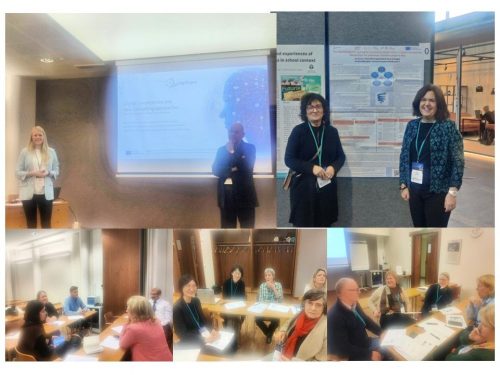
As announced, the CGC-DigiTrans project was presented at the IAEVG international conference in Jyväskylä on November 12-14, 2024.
More than five hundred people attended the conference, and it was a great opportunity to discuss our project and the Roundabout methodology.
Jenny Schulz and Jan Woldendorp carefully prepared the workshop titled ‘Digital competences and new counselling approaches for CGC professionals riding the wave of change’ that allowed about 15 participants to glance at the digital competences model developed in the project’s first phase.
After a reflective activity, the Roundabout methodology was introduced and the case of Julia was analyzed. A lot of questions were raised about the project and the methodology. We thank all the participants for their interest in the project and the fruitful discussion. We are aware that the 90 minutes of workshop allows us to provide only a summary of the work done in two years of the project and we are glad to have stimulated curiosity and questions in the participants.
Accordingly, we invite you to explore the website CGC-DigiTrans and attend the online course.
In addition during the conference a poster was presented by Lea Ferrari, Teresa Maria Sgaramella and Ilaria Di Maggio on the Italian practitioners involved in the project. In the study 1 the opinions of the Italian CGCs about the attention devoted to digitalization of their clients were presented. The study 2, instead, showed their perceptions about the roundabout methodology preparatory course they attended.
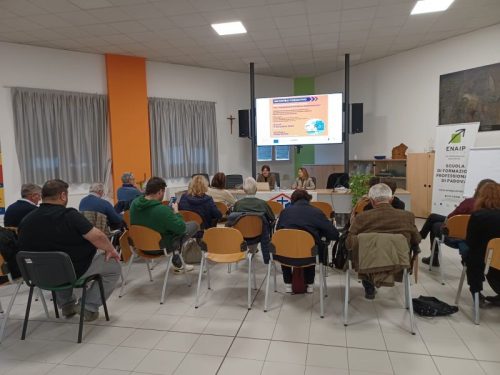
It was such a great pleasure to present the DIGITRANS project to a group of enthusiastic volunteers and professionals who aim to make a difference in the lives of the people they meet.
Thanks to Dr. Paola Pertegato for the presentation and for making this event possible. Thanks to Dr. Francesca Scudiero and Acli Padova for the opportunity and to ENAIP Veneto for hosting us.
Looking forward to the CGC-DigiTrans workshop at the IAEVG conference next week! ☃️
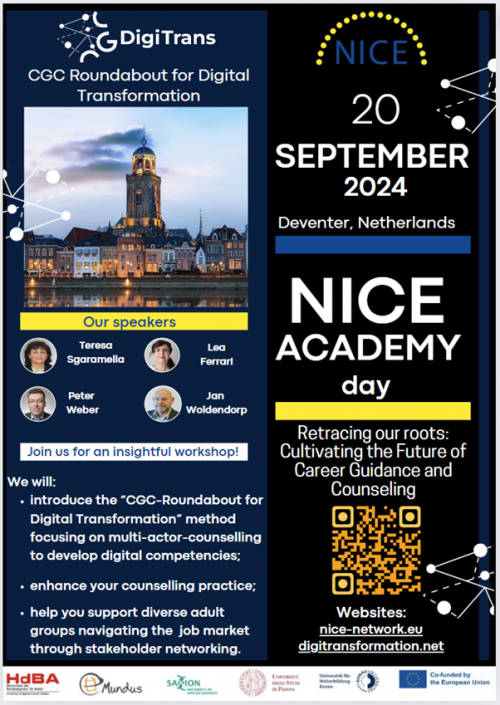
CGC-Roundabout for Digital Transformation Workshop: Deventer, 20 September 2024
On September 20, 2024, the CGC-DigiTrans project team hosted a workshop during the Academy Day of the NICE network in Deventer, the Netherlands. The event brought together international researchers and professionals from Austria, Italy, Germany, and the Netherlands to explore the intersection of digital transformation and career guidance.
Participants gained valuable insights into the project’s digital competences model and the “CGC-Roundabout for Digital Transformation” – a multi-actor career guidance methodology. The workshop addressed challenges faced by different adult groups in the evolving job market and explored strategies to improve access to counselling services.
Through interactive sessions, attendees engaged with practical tools from the CGC-DigiTrans handbook, designed to enhance counselling practices in the digital age. The workshop was particularly relevant for career counsellors, HR professionals, education providers, and others interested in the future of career guidance.
The program featured case studies and best practices from successful implementations of digital strategies in counselling. Participants also had the opportunity to engage in hands-on activities, applying the CGC-DigiTrans methodologies to real-life scenarios. Dedicated networking sessions encouraged collaboration and knowledge exchange among professionals from across Europe.
We are grateful to everyone who joined us in Deventer and contributed to making the workshop a success. Events like this play a key role in advancing career guidance in a digitally transforming world.

CGC-DigiTrans Training Day – Padua, 1 March 2024
On March 1, 2024, a full training day dedicated to the CGC-DigiTrans project was held at the Department of FISPPA, University of Padua, Italy.
As part of the activities foreseen in Work Package 2 (WP2), participants had the opportunity to explore the CGC Roundabouts methodology for digital transformation in career counselling and guidance.
In line with the project’s strong emphasis on networking and multi-actor collaboration, the training brought together nearly twenty professionals from diverse backgrounds. Participants included experts in guidance, career counselling, human resources, professionals from training institutions and public/private citizen services, staff from employment centres, representatives from the third sector and volunteering organisations, social workers, psychologists in training, and grant writers.
During the event, the project and its progress were presented, followed by practical sessions aimed at exploring various hands-on aspects of the developed methodology.
Following the training, consultants and professionals were invited to implement the tools in their own practice settings and provide feedback to the project team in the coming months. The tools are available free of charge for professional use and evaluation.

